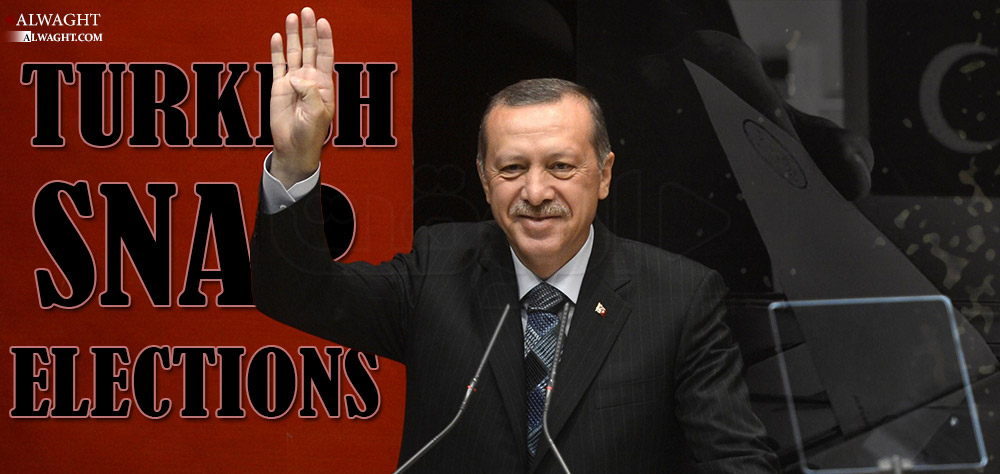Alwaght- Over the past few days, two important developments took place in Turkey, which are believed to have a resounding influence on the country’s political equations.
On April 18, Turkish parliament extended the state of emergency, in place since 2016 when the nation was hit by a failed military coup aimed at overthrowing President Recep Tayyip Erdogan and his ruling Justice and Development Party (AKP). Another event was declaring the snap elections in the country. A day after meeting with Devlet Bahceli, the head of the Turkish National Movement Party (MHP), on April 18, Erdogan announced that the country will hold early presidential and parliamentary elections on June 24, i.e. one and half a year before the scheduled time.
According to the electoral timetable, local elections were to be held in March 2019, and to be followed by the Grand National Assembly and the presidential elections in October of the same year. But Erdogan’s declaration of snap vote signals that the AKP is beginning a big political game meant to solidify its grip on the power.
The decision is coming while Turkey since the start of the year launched a massive military campaign, dubbed Operation Olive Branch, in northern Syria, specifically in Afrin that is a predominantly Kurdish enclave. Turkey argues that northern Syria is home to militias of People’s Protection Units (YPG) that argues describes as the Syrian branch of the Kurdistan Workers (PKK), which has been fighting the Turkish government at home for over four decades. At home, on the other side, a large number of opponents of President Erdogan and the AKP are imprisoned as part of a large-scale campaign of purging launched in the wake of the failed power grab attempt. In the middle of such a tough situation, the ruling party appears to be running an agenda to broaden its national base, which also brings about further political might to the president himself.
Preparing the ground for applying constitutional referendum results and Erdogan’s new presidency
Without any doubt, the key drive behind Erdogan’s announcement of the snap vote in the summer is paving way for implementing results of last year's referendum to reform the nation’s constitution. Held throughout the country on 16 April, 2017, the plebiscite asked the voters whether they approved 18 proposed amendments to the Turkish constitution that were brought forward by the governing AKP and the NHP. The amendments received overwhelming yes vote preparing the ground for Erdogan to change the country’s parliamentary system to presidential.
According to the political reforms timeline, the implementation of the referendum results was set for after the 2019 elections. But the president brought the schedule ahead by announcing early elections.
A set of party leaders are slated to join the presidential race by announcing candidacy. The Secretary-General of iYi Party (Good Party) Meral Aksener, Secretary-General of Homeland Party Dogu Perincek, Kemal Kilicdaroglu or Ilhan Kelsici of the Republican People’s Party (CHP), and a candidate from the Kurdish People’s Democratic Party are expected to run for presidency. A look at the status of political coalitions makes it clear that Erdogan with backing from the MHP can win a 50 percent of the vote, the threshold that will allow him to assume the office as a president once again.
Strengthening AKP base and power
Another reason for snap election should be sought in Erdogan’s aim to give his party a fresh power boost at the parliament. In the October 2015 elections, the AKP won 49.48 percent of the nationwide vote. The result granted the party 317 from the total 550 seats of the parliament, and naturally the right to form a government. Now the AKP, in power since 2002, wants to benefit from the nationalistic gesture it is building through its cross-border military operations to press up its vote over 50 percent.
Impairing the Kurdish parties politically and electorally
The Kurdish People’s Democratic Party in the 2015 parliamentary elections won about 11 percent of the votes, which meant 59 seats. It was the first Kurdish party to pass the 10 percent threshold necessary to enter the Turkish parliament. During their activity over the past four years, the party’s representatives harshly blasted the policies of the ruling party. The criticism of the Kurdish sides of the parliament against Erdogan reached to a level that he lost his toleration with the Kurds. Fifteen Kurdish legislators on November 4, 2016, ended up detained by the security forces. The government forces arrested the co-leaders of the party Figen Yuksekdag and Selahattin Demirtas in a blow to the Kurdish party’s political position. After the detention of a large number of the Kurdish leaders and activists, erosion of the power of the Ankara’s archenemy PKK following a period of home clashes with the Turkish army, and also rise of the nationalist iYi Party, the Kurds' political strength appears to have severely eroded. While Turkey's Kurds are suffering from a political nadir, the AKP leaders are putting forward the early poll to wrest the Kurdish party’s seats from it.
Inter-AKP reckoning
Erdogan had yet another drive to bring people to vote ahead of the schedule. He finds it a political imperative to do some inter-party purges. A part of the AKP lawmakers in the current parliament are at odds with Erdogan and take a course opposite to his policies. He wants to send to the future parliament figures close to him. All these arrangements are meant to create political atmosphere open to Erdogan’s power solidification.



























